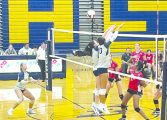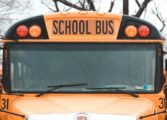This is Sabrey Garling’s second year at Fluvanna County High School (FCHS). The Leesburg native started her college career at Northern Virginia Community College and transferred to the University of Virginia (U.Va.). She graduated with a bachelor’s degree in English in May 2015.
Last year Garling saw 100 percent of FCHS’s senior class and 60 percent are now in a two or four-year college, she said.
Director of VCAC Joy Pugh said the program started 11 years ago at U.Va. and has since expanded to a nationwide effort. More than 100 U.Va. graduates have spread across the commonwealth to assist Virginia high school students in their higher education decisions.
“Over a six-year period, our partner high schools saw an average increase in their college matriculation rate of 9.7 percentage points,” Pugh said. “This is an exceptional outcome and amounts to thousands of Virginians going on to post-secondary education who wouldn’t have without the support and assistance of a college adviser.”
Fluvanna County high school counselor Samantha Lewis is Garling’s immediate supervisor. Lewis said Fluvanna has been working with the VCAC program since its inception. Garling is the sixth VCAC adviser to work at the high school.
One of the ways the VCAC advisers help is by reviewing college applications, essays and scholarship applications. They also help counselors make sure students meet application deadlines.
Garling is trained in the most recent changes to the Free Application for Federal Student Aid (FAFSA), Lewis said. Besides holding a “Super Saturday” FAFSA event and evening sessions at the high school, Garling offers individual appointments for parents to come in and complete the application.
“Sabrey has been a tremendous asset to our school,” Lewis said. “She does classroom presentations, helps coordinate and chaperone field trips… Like many of the advisers before her, Sabrey has become a key part of our career center services and our school environment as a whole.”
The Fluvanna Review asked Garling a few questions:What’s a career goal of yours?
Currently I hope to work either in student affairs or admissions at the collegiate level.
How does your two-year stint advising at FCHS fit into your goals?
As a second year adviser, I have a better understanding of this year’s senior class and their needs, which allows me to prioritize whom to meet with. For example, I can focus on students early in the school year who are on free and reduced lunch to ensure they use fee waivers for standardized tests and college applications.
What group of students are assigned to you? Is it by grade, race, economic status, family educational status?
I work with all students at Fluvanna but I’m primarily responsible for the senior class. I decide how to prioritize student meetings. Typically I start with high-achieving students since they are more likely to apply to four-year schools, consequently resulting in more steps with tighter deadlines than community college-bound students. My main goal, however, is to provide college access to low-income, underrepresented, and first-generation students. Therefore, I’ll meet with those students the most throughout the year to make sure they don’t fall through the cracks.
Without divulging identifying information, can you tell us about an encounter with a student at FCHS that stood out in your mind?
I had a student who didn’t think college was for him since he was low-income and first-generation. He thought he’d become a famous rapper. After several meetings, getting to know him better, and showing him his options, he decided to try community college. Once he made that decision, there was no stopping him! Within one week he applied to PVCC, took his placement tests, and even got his driver’s license. I’m very proud of his accomplishments because it shows that some students need a little encouragement to go a long way.
What do you think is the value of the program under which you’re working?
Serving as a college adviser means helping students see their collegiate potential. It is showing students that they do have options and helping them every step of the way. Ultimately working for the VCAC allows me to impact students now and for the rest of their lives by helping to make college possible for them.
Tell us about an experience you’ve had at FCHS in which you learned something.
I quickly learned at FCHS that students want to feel valued. For example, I had a big event last November called College Night. I asked about 10 students to help volunteer and they jumped at the opportunity. They absolutely loved feeling important and helping me out. In fact, all of those students became pretty close to me and continued to help me throughout the year. Overall I realized that if I value students they are more willing to value themselves.
Working with over 270 seniors last year taught me a lot about that demographic and about myself. Mainly, I never imagined that I would love working with students as much as I do. When thinking about what motivates me to do my job, I concluded that it is the chance to meet with students every day. Now I can’t fathom having a career that doesn’t involve mentoring students, which explains why I want to work in either student affairs or admissions at a college or university. I’ve found that students are some of the best resources in a school and through mentoring, I can help them achieve their goals and they can help me achieve mine.
In addition to being a college adviser, I’m also one of the high school’s prom coordinators and an assistant coach for the girls’ varsity tennis team. Being involved outside the walls of my office enabled me to learn a great deal about the high school’s administration, staff, students, and the community of Fluvanna. As a result of my experiences with prom and tennis, I’ve grown fonder of Fluvanna and enjoy contributing to its community. It is important to me show my appreciation for Fluvanna by contributing to it and building a rapport with its members. I may not be from Fluvanna but I certainly feel like a Fluco.
What is the educational status of your parents? How did you pay for college? If you have siblings, have they gone to college?
My dad has a bachelor’s degree in engineering and my mom has a high school diploma. I was a low-income student throughout high school and initially didn’t know if college was going to be in my near future. However, thanks to the Federal Pell Grant, I was able to attend community college and got a fantastic financial-aid package while at U.Va. My younger brother followed the same path and is currently a third year at U.Va. this fall.




